The new travel retreats addressing depression and grief
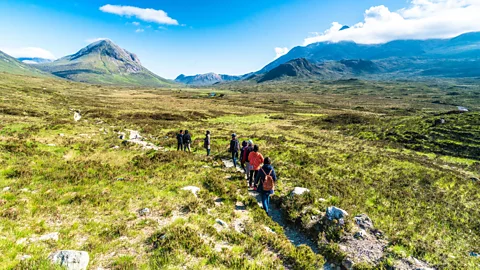 Getty Images
Getty ImagesThey combine outdoor pursuits and mental health support for anyone who wants to improve their wellbeing, with or without a diagnosis.
At the top of a hill in England's Peak District, life coach Zaidha Roscoe leads our group in an exercise to ground us in the present moment and find a sense of calm. "Focus on five things you can see, four you can touch, three you can hear, two you can smell and one you can taste," she says. I notice cheery-neon hiking clothes against a cornflower-blue sky. Brush my fingers along the feathery grass. Tune in to a duet of chirping birds. Smell the crisp autumn air. And bite into nutty trail mix.
It's the first of several mindfulness and nature connection activities we will do on this six-mile hike through Chatsworth Estate with Mind Over Mountains. The organisation hosts free wellbeing walks and low-cost weekend retreats led by mountain guides and qualified counsellors or coaches at national parks and Areas of Outstanding Natural Beauty across the UK. It's one of a few organisations – including Blackdog Outdoors in the UK and Hiking My Feelings in the US – that combine outdoor pursuits and mental health support for anyone who wants to improve their wellbeing, with or without a diagnosis.
These organisations fill a canyon-sized gap in the outdoor and wellness spaces. Half of the world's population will develop a mental health disorder in their lifetime. But while many places offer self-care activities such as yoga or forest bathing, these programmes rarely foster an atmosphere that encourages confiding to your instructor about your depression or chatting with fellow participants about grief. So, many people may feel isolated and unsupported in these settings.
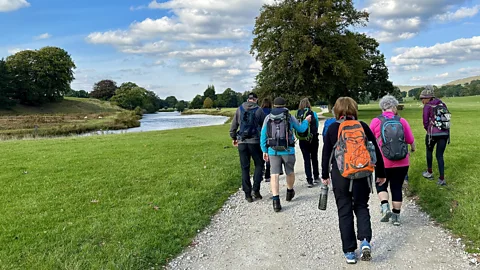 Keridwen Cornelius
Keridwen CorneliusOrganisations like Mind Over Mountains create a space where discussions about emotions and difficulties are welcome. At our first stop on the walk, Rob Kenning, a member of the wellness team, tells our group, "Today, I've brought confident leader Rob, but there's also a more vulnerable Rob that might be more difficult for me to bring because it challenges the more masculine side of me. I invite you all to bring as much of yourself as you would like to bring – physically, mentally, emotionally. You know how much of yourself it's safe to bring."
We follow the trail through a woodland and emerge at a 16th-Century hunting tower. Kenning invites us to share how we're feeling now compared to when we started. Three participants admit they nearly cancelled because they were nervous about meeting new people, or because this place reminds them of outings with a loved one who recently died. But they're all glad they mustered the courage to come.
BBC Travel's Well World is a global take on wellness that explores different ways that cultures the world over strive for a healthy lifestyle.
I thought the mood on a mental health walk might be heavy but the conversation is convivial, open and supportive. As we ramble through a beech forest and lunch by a lake, we delight in photographing red and purple mushrooms and feeling the fuzzy moss on gnarled trees. If someone needs a private word with Roscoe or Kenning about issues they're dealing with, they hang back a bit or walk to the side, and the rest of us give them time and space. It's like a casually choreographed dance of compassion and care.
Several participants and guides tell me that strolling side-by-side in nature makes it easier to share their struggles or delve into deep discussions than when they're indoors, staring into the eyes of a family member or a psychotherapist. "Being in nature relaxed me and helped me open up," says Matt Heaton, who participated in a Mind Over Mountains retreat in 2022. "It just felt free because it's such a beautiful place. And there were a couple of moments where I really felt connected with nature and the world."
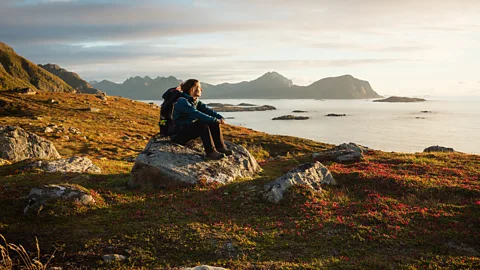 Getty Images
Getty ImagesA rising tide of research shows that people who feel more connected to nature report happier and more meaningful lives. They also tend to have lower levels of depression, anxiety and other mental health issues. In my own life, connecting with nature through foraging, wild swimming, hiking and intuitive nature communication has done wonders for my mental health and sense of purpose.
Andy Higson, a civil engineer who started Blackdog Outdoors, had a similar realisation in a hut atop Mt Elbrus in Russia. As he chatted with other mountaineers about what brought them to the peak, they described nature as their therapy – a way to get out of the fast pace of life, to challenge themselves and find balance. "That got me thinking," Higson says. "If I know nature is really good for me, and these people I've never met before from different parts of the world all think the same thing, then why are more people not using the outdoors as a coping mechanism for mental health?"
When Higson researched the question, he found that many people face barriers to taking part in outdoor pursuits, including anxiety, lack of skills and costs. To help people overcome those hurdles, he founded Blackdog Outdoors. The group holds around 120 free hiking, climbing and paddle sport daytrips each year, plus low-cost mountain skills training.
Blackdog Outdoors' events are geared toward newbies or people who have engaged in outdoor sports in the past but have lost the confidence or desire to do so on their own. The trips are led by outdoor professionals and trained mental health first aiders, not professional therapists. And though the organisation doesn't include mindfulness exercises, the mental health supporters can help with everything from chatting about relationships to easing anxiety about a nerve-wracking activity.
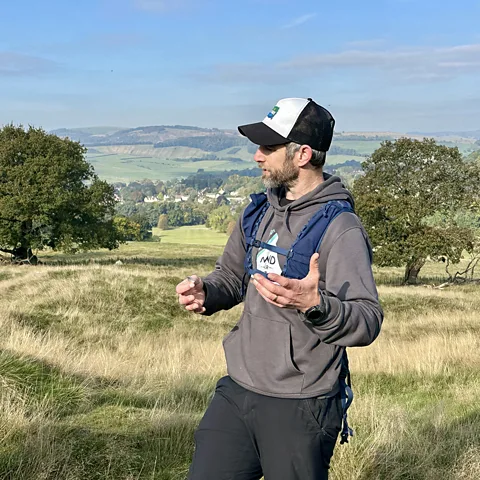 Keridwen Cornelius
Keridwen CorneliusThrough surveys, both Blackdog Outdoors and Mind Over Mountains have found that more than 90% of participants experience a lasting mental health benefit from the events. Heaton was so inspired by his retreat with Mind Over Mountains that he trained to be a mental health first-aider and walked a marathon to raise funds for the organisation. "I still, to this day, say it's the best weekend I've ever had," he says.
Ruth Israel, who participated in a Mind Over Mountains retreat, says, "The walk was a catalyst for hope and personal growth. With hindsight, the lasting impact is more than you can imagine from just one walk. I'd never been part of such an accepting, non-judgmental community before… I've become a lot more open about sharing my own struggles so that others can be encouraged and supported."
When I join a Blackdog Outdoors hike in the Peak District, one of the guides remarks that it's the kind of day he would normally stay in. We pull on our waterproofs and woolly caps to block the drizzly wind and squelch through a primordial soup of mud. Even a participant's shepherd dog, who began the hike with characteristic canine enthusiasm, looks at us like we're crazy as we hoist him up rain-slicked rocks by a steep waterfall.
Surprisingly, it's fun. On both these mental health hikes, I've realised that the conversations feel connecting and the guides are supportive, but our main group therapist is the great outdoors. Nature seems to hold a mirror up to different aspects of ourselves and whisper metaphorical messages.
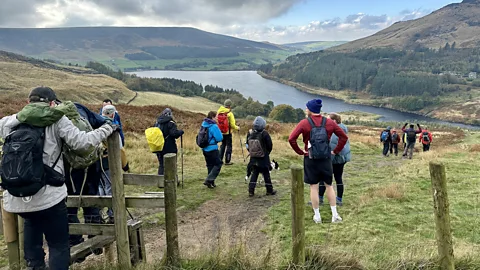 Keridwen Cornelius
Keridwen CorneliusDuring a Mind Over Mountains exercise to find a tree that spoke to us, a woman and I are drawn to a rowan whose silvery trunks diverge, then intertwine. She reflects on the choices she's made and the twisting path her life has taken. As we sit by a river, Roscoe asks us to muse on the things it is time to release and let flow away.
On this Blackdog Outdoors hike, the chilly rain, slippery boulders and precarious slopes urge us to find our inner resources, persevere through challenges and reach out for helping hands. Then the sun emerges, electrifying the clouds and shimmering across Dovestone Reservoir. And I am reminded of the poem Wild Geese by Pulitzer Prize-winning poet Mary Oliver, who found solace for her sadness in nature. Like the geese, everything in this glorious, gleaming landscape seems to call out through loneliness and despair, "announcing [our] place in the family of things".
--
If you liked this story, sign up for The Essential List newsletter – a handpicked selection of features, videos and can't-miss news, delivered to your inbox twice a week.
